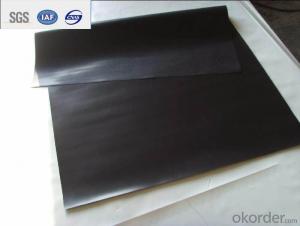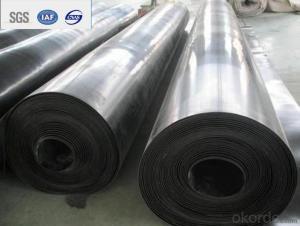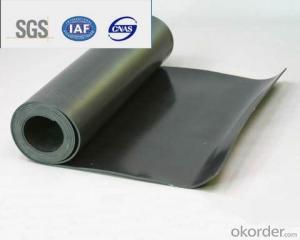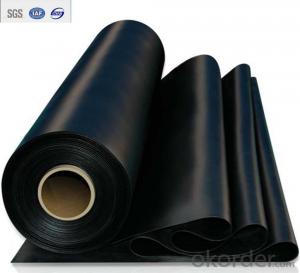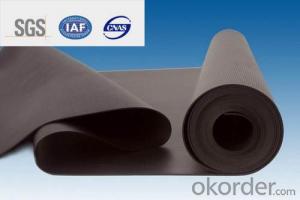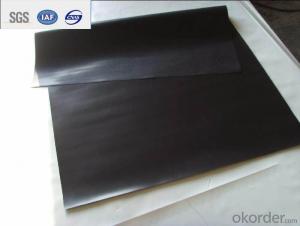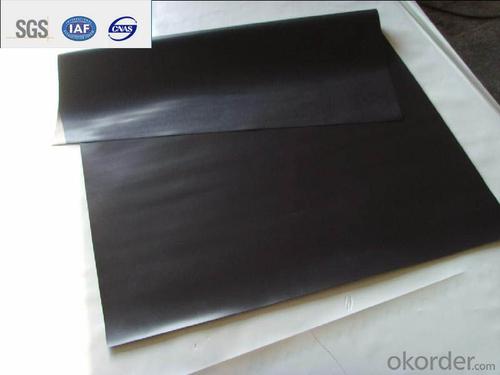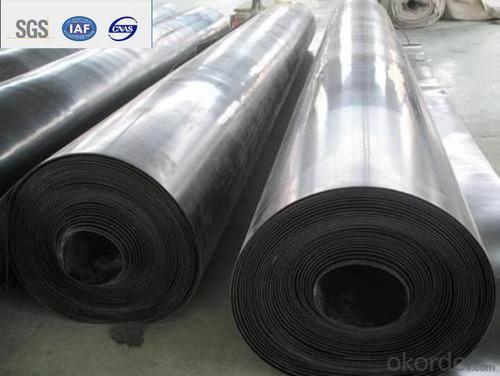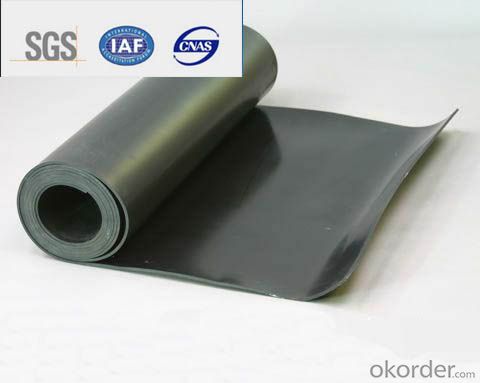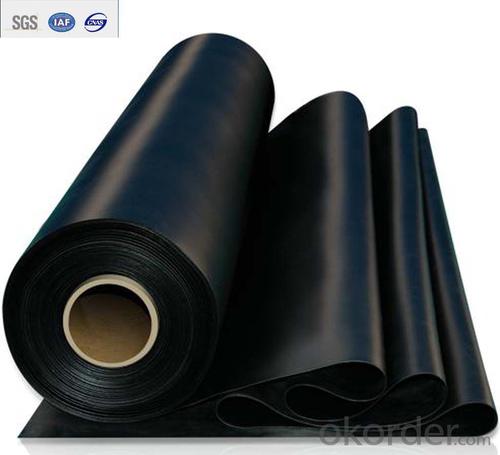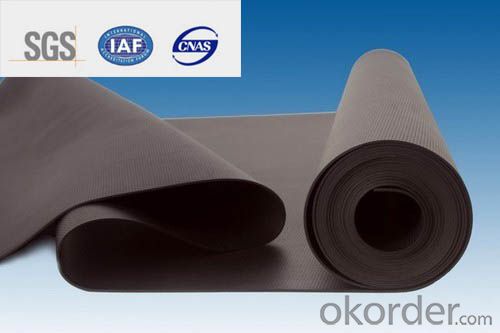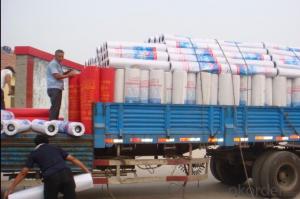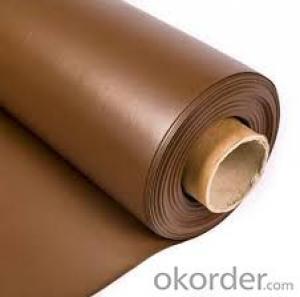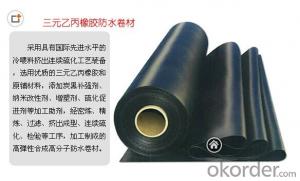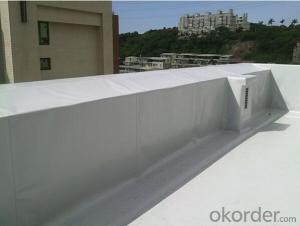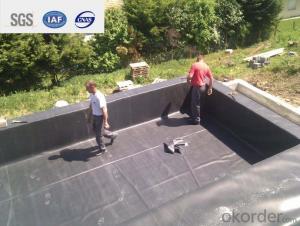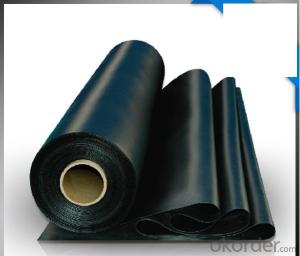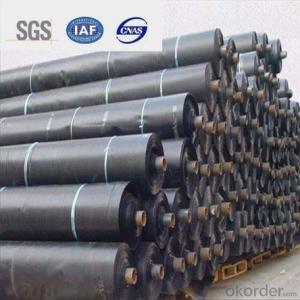EPDM Waterproofing Roofing Membrane with 1.5mm
- Loading Port:
- Qingdao
- Payment Terms:
- TT or LC
- Min Order Qty:
- 2000 m²
- Supply Capability:
- 800000 m²/month
OKorder Service Pledge
OKorder Financial Service
You Might Also Like
Description Of EPDM Rubber Waterproof Membrane:
This waterproof coiled material is of high elasticity with best performance among high polymer waterproof coiled material in the world.It is also the most typical one in the world.Waterproof coiled material made of ternary ethylene-propylene rubber is produced with the use of the most advanced continuous extrusion and vulcanization technology and related equipments which are specially designed for production of such product.It is good in compactness,without bubble and performance difference in length and breadth,performances reach or exceed the demands of GB18173.1-2012 standard.
Main Features of EPDM Rubber Waterproof Membrane:
1>Excellent anti-aging performance, service life up to 50 years
2>Working well with in -40°C to 100°C,it can be constructed with a single layer in ambient temperature.
3>Waterproofing on various kinds of underground project,industrial of civil buildings and structures.
4>high extension rate, high tensile strength, small size changes at heat treatment
5>Good plant roots penetrability resistance and can be made waterproofing layer of planting roof
6>Special modified molecular structure ,effectively resolving the current domestic and foreign glue joint problem .
7>Good low temperature flexibility, and good performance of adapting to ambient temperature changes.
8>Convenient application ,solid joint, no environment pollution
9>chemical corrosion Resistance, can be used for special occasions
Specifications of EPDM Rubber Waterproof Membrane:
Material | EPDM Rubber |
Size | 1.2m (width)*20m (length) or customized, weldable type 2.05m or 4m width |
Thick | 1.2mm, 1.5mm, 2.0mm |
Type | Vulcanized & Weldable |
Pattern | Non-reinforced (homogeneous) |
Certificate | ISO9001/14001 |
Applications of EPDM Rubber Waterproof Membrane:
1.Roofs, Basement, Toilets
2. Industrial and civil building waterproofing
3. Geosynthetic liner for swimming pool, channels, irrigation system
4. Especially suitable for projects with high requirements in durability, anti-corrosion and deformation.
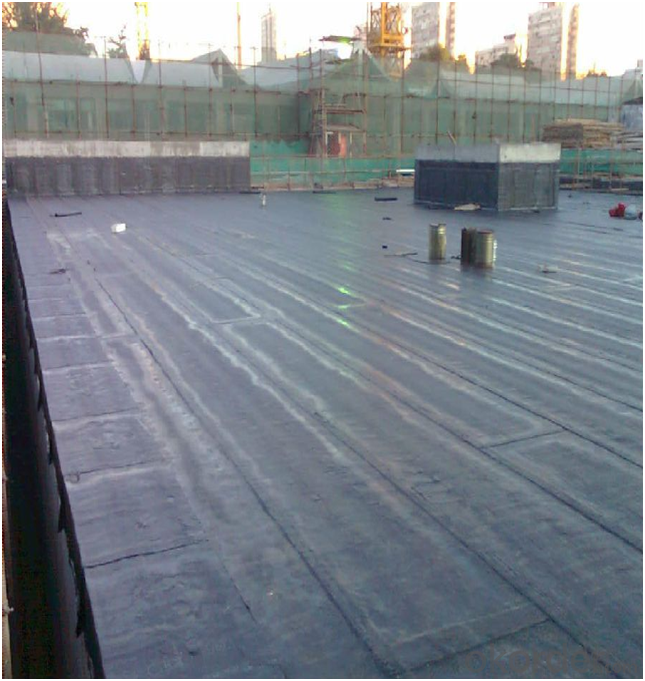
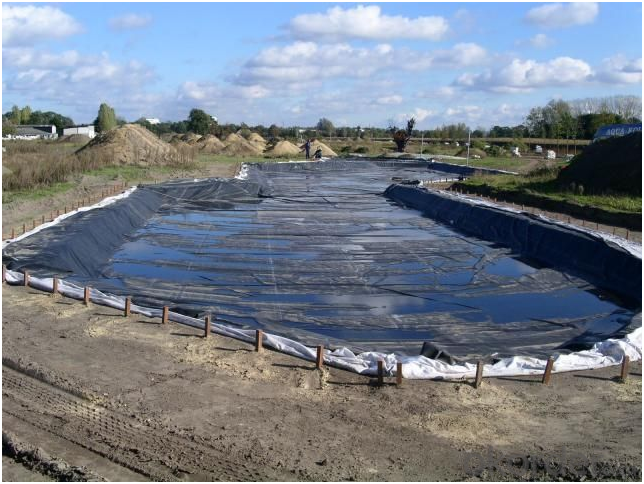
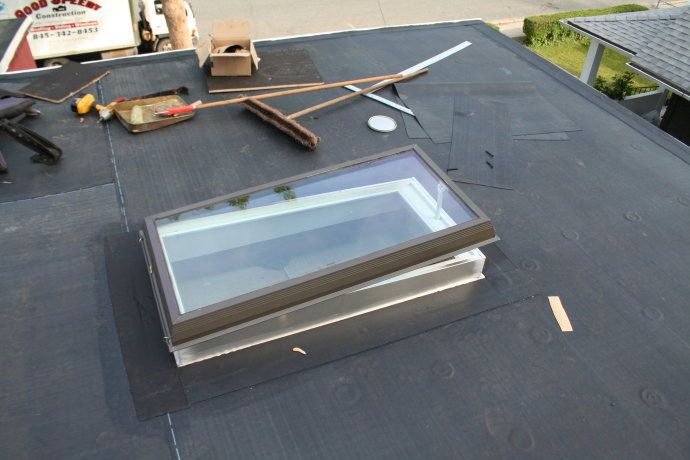
FAQ:
1. What are we supplying?
We are specialized in producing Colorful Asphalt Roof Shingle, SBS/APP modified bitumen waterproof membrane, Self adhesive bitumen waterproof membrane, PVC waterproofing membrane, EPDM rubber roofing membrane, Single Component Polyurethane Waterproof Coating, and Spray Polyurea Waterproof Coating.
2. How Many years experience do we have?
We have been exported to more than 20 countries in the past 15 years.
3. How long do we usually reply your request?
We always reply our customer within 24 hours.
- Q: Are waterproofing membranes resistant to water vapor transmission?
- Yes, waterproofing membranes are designed to be resistant to water vapor transmission. They are specifically engineered to prevent the penetration of water vapor through the membrane, ensuring effective waterproofing and moisture control.
- Q: Are waterproofing membranes suitable for rooftop gardens?
- Yes, waterproofing membranes are suitable for rooftop gardens. As rooftop gardens are located on top of buildings, it is essential to have proper waterproofing in place to prevent water leakage and damage to the structure. Waterproofing membranes are specially designed to create a barrier that prevents water from seeping into the building. These membranes are typically made of materials such as rubber, PVC, or modified bitumen, which are highly resistant to water penetration. Rooftop gardens involve the use of soil and plants, which require regular watering. Without a reliable waterproofing system, excess water from irrigation or rainfall can seep into the building, leading to issues like water damage, mold growth, and structural deterioration. Waterproofing membranes provide a durable and long-lasting solution to this problem by effectively sealing the rooftop and preventing any water infiltration. Moreover, waterproofing membranes can also offer additional benefits for rooftop gardens. They act as a protective layer against root penetration, preventing plant roots from damaging the roof structure. Additionally, these membranes can help to regulate the temperature of the building by reducing heat absorption from the sun, thereby improving energy efficiency. It is important to note that the selection and installation of waterproofing membranes should be done by professionals with expertise in waterproofing systems. They will ensure that the membranes are correctly installed, free from any defects or punctures, and properly integrated with other roofing components. In conclusion, waterproofing membranes are indeed suitable for rooftop gardens as they provide the necessary protection against water ingress, root penetration, and structural damage. By investing in a reliable waterproofing system, rooftop gardens can thrive while maintaining the integrity and longevity of the building beneath.
- Q: Can a waterproofing membrane be used for residential buildings or homes?
- Yes, a waterproofing membrane can be used for residential buildings or homes. Waterproofing membranes are commonly used in construction to prevent water penetration and protect the building's structure and interior from moisture damage. They can be applied to various areas such as basements, roofs, foundations, and bathrooms, among others. By creating a barrier against water, these membranes help to prevent leaks, mold growth, and damage to the building materials. Therefore, using a waterproofing membrane is an effective way to ensure the longevity and durability of residential buildings or homes.
- Q: Can a waterproofing membrane be applied on top of insulation materials?
- Yes, a waterproofing membrane can be applied on top of insulation materials. However, it is important to ensure that the insulation material is properly installed and does not compromise the effectiveness of the waterproofing system. Additionally, the type of insulation material used should be compatible with the waterproofing membrane to avoid any potential issues or damage.
- Q: Can a waterproofing membrane be painted or coated?
- Indeed, it is possible to paint or coat a waterproofing membrane. However, it is crucial to utilize a paint or coating specifically formulated for application on waterproofing membranes. Typically, these types of paints or coatings possess elastomeric properties, enabling them to stretch and flex along with the membrane, preventing any cracking or peeling. Moreover, it is vital that the paint or coating is compatible with the material of the waterproofing membrane to ensure proper adhesion and long-lasting results. Prior to applying any paint or coating, it is advisable to thoroughly clean and prepare the surface in accordance with the manufacturer's instructions. Additionally, adhering to the recommended application process and allowing ample time for the paint or coating to dry and cure is of utmost importance. Overall, painting or coating a waterproofing membrane can enhance its visual appeal, offer added protection against UV rays and environmental elements, and prolong its lifespan.
- Q: Can a waterproofing membrane be used for an industrial facility floor?
- Yes, a waterproofing membrane can be used for an industrial facility floor.
- Q: Is a waterproofing membrane resistant to saltwater or other corrosive substances?
- Yes, a waterproofing membrane is generally resistant to saltwater and other corrosive substances. Waterproofing membranes are designed to provide a barrier against moisture and water penetration, which includes protection against corrosive substances. These membranes are typically made from materials such as modified bitumen, PVC, EPDM, or TPO, which have inherent resistance to saltwater and other corrosive elements. Additionally, some manufacturers may also incorporate additional protective layers or coatings to enhance the membrane's resistance to corrosive substances. However, it is important to note that the level of resistance can vary depending on the specific type and quality of the waterproofing membrane used. Therefore, it is crucial to choose a high-quality membrane that is specifically designed for the intended application, such as saltwater environments or areas exposed to other corrosive substances.
- Q: Can a waterproofing membrane be used for schools or universities?
- Yes, a waterproofing membrane can definitely be used for schools or universities. These membranes are designed to provide protection against water damage, preventing leaks and moisture intrusion in buildings. By installing a waterproofing membrane, schools and universities can ensure the longevity of their structures, protect valuable assets, and maintain a safe and comfortable environment for students and faculty.
- Q: Are waterproofing membranes resistant to salt damage?
- Yes, waterproofing membranes are generally resistant to salt damage. Waterproofing membranes are designed to provide a barrier against moisture and water infiltration, and this includes protection against saltwater. Saltwater can be highly corrosive and can cause damage to various materials, but waterproofing membranes are typically made from materials that are resistant to the corrosive effects of salt. These membranes are often composed of materials such as reinforced PVC, modified bitumen, or EPDM rubber, which have proven to be durable and reliable in saltwater environments. Additionally, waterproofing membranes are commonly used in applications such as basements, swimming pools, and marine structures, where they are exposed to saltwater regularly. Therefore, it can be concluded that waterproofing membranes are generally resistant to salt damage and can provide effective protection against saltwater infiltration.
- Q: Is a waterproofing membrane compatible with different types of flooring materials?
- Yes, a waterproofing membrane is compatible with different types of flooring materials. It can be used with various flooring options like tiles, hardwood, laminate, vinyl, and more to provide protection against water damage and ensure a long-lasting and durable flooring installation.
Send your message to us
EPDM Waterproofing Roofing Membrane with 1.5mm
- Loading Port:
- Qingdao
- Payment Terms:
- TT or LC
- Min Order Qty:
- 2000 m²
- Supply Capability:
- 800000 m²/month
OKorder Service Pledge
OKorder Financial Service
Similar products
Hot products
Hot Searches
Related keywords
